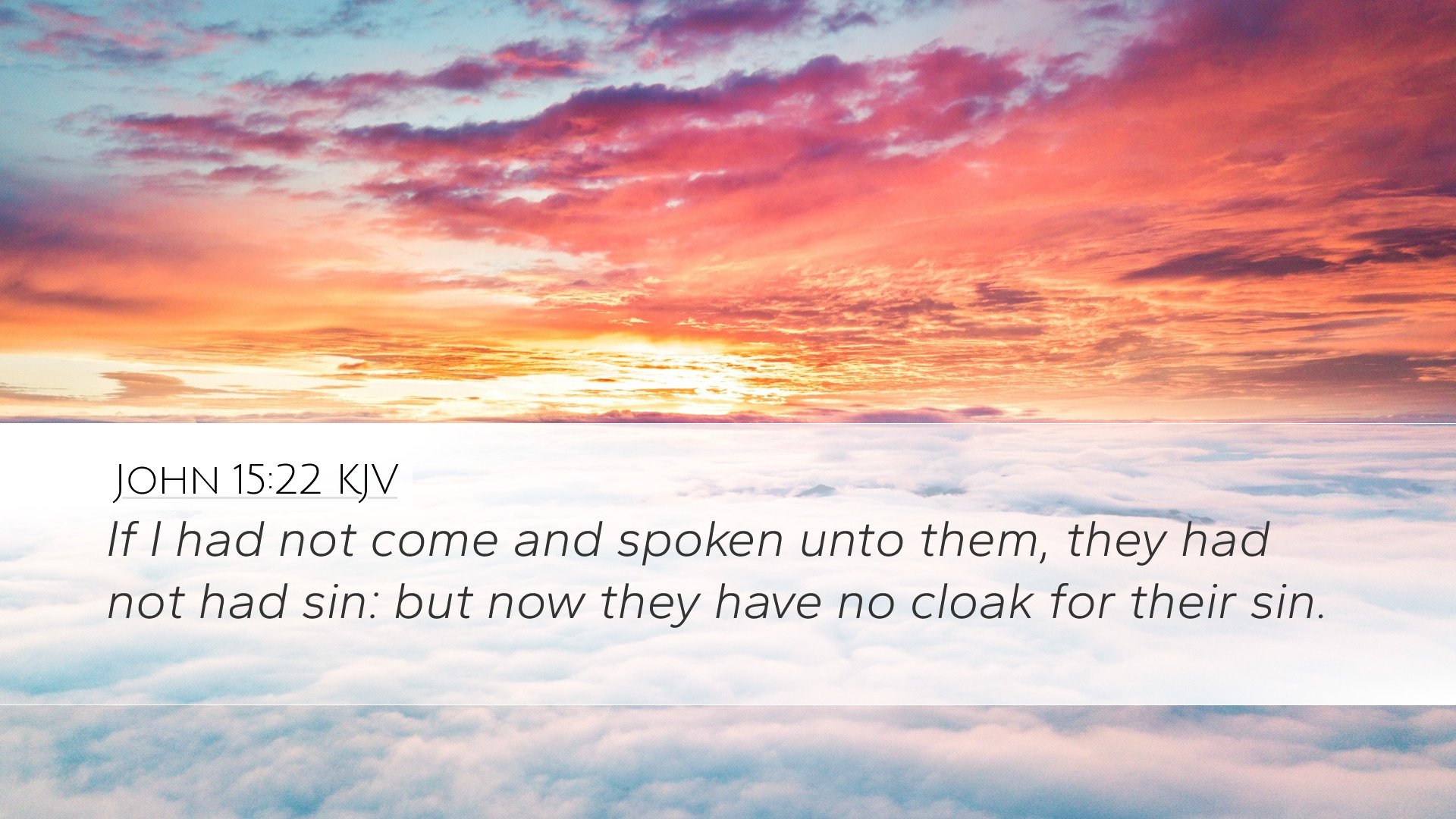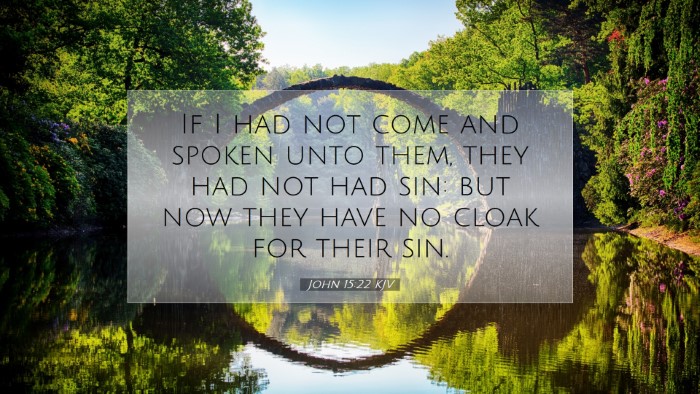Old Testament
Genesis Exodus Leviticus Numbers Deuteronomy Joshua Judges Ruth 1 Samuel 2 Samuel 1 Kings 2 Kings 1 Chronicles 2 Chronicles Ezra Nehemiah Esther Job Psalms Proverbs Ecclesiastes Song of Solomon Isaiah Jeremiah Lamentations Ezekiel Daniel Hosea Joel Amos Obadiah Jonah Micah Nahum Habakkuk Zephaniah Haggai Zechariah MalachiJohn 15:22
John 15:22 KJV
If I had not come and spoken unto them, they had not had sin: but now they have no cloak for their sin.
John 15:22 Bible Commentary
Commentary on John 15:22
Verse Context: John 15:22 states, "If I had not come and spoken unto them, they had not had sin: but now they have no cloak for their sin." This verse is a pivotal part of Jesus’ discourse on the role of believers and the nature of sin in light of His revelation to the world.
Overview
The statements made in this verse reflect profound theological truths about human responsibility, sin, and the revelation of God's truth through Christ. The confrontation between Jesus and the religious leaders of the time is highlighted, emphasizing a critical distinction between ignorance and guilt.
Historical Background
In the backdrop of this statement, Jesus is preparing His disciples for the challenges they will face after His departure. The Jewish leaders, having been called to a covenant relationship with God, faced the reality of their rejection of His Son, which intensifies their accountability.
Theological Significance
John 15:22 provides an essential insight into the nature of sin and accountability:
- Ignorance vs. Accountability: Matthew Henry notes that ignorance of Christ’s teachings can provide a measure of covering for sin, but once the truth is revealed, the responsibility for rejection increases. The exposure of truth creates a duty to respond.
- The Role of Christ's Revelation: Albert Barnes emphasizes that Christ's coming and teachings elevate the standard of moral responsibility. Prior to His revelation, humanity was in a state of lesser understanding; with His arrival, a clear distinction is drawn between light and darkness.
- The Cloak of Sin: Adam Clarke elaborates that "cloak" represents a covering or a false justification for sin. When Jesus speaks, the true nature of sin is uncovered, leading to heightened condemnation for those who reject Him.
Practical Applications
For pastors and theologians, the implications of this verse are significant:
- The Call to Proclamation: The necessity of preaching the Gospel is reaffirmed; believers must communicate Christ’s teachings clearly as ignorance is being eroded by widespread access to the biblical text.
- Responsibility in Leadership: Church leaders have the responsibility to adequately teach and reveal God’s truth, ensuring their congregation is aware of the full scope of sin and the need for repentance.
- Encouragement in Evangelism: The verse provides motivation for evangelistic efforts. Understanding the seriousness of sin and the light of Christ empowers believers to reach out to those who have not yet encountered Jesus.
Warnings Against Rejection
The text carries a stern warning against the spiritual danger posed by rejecting the knowledge of salvation:
- Heeding the Truth: Both Henry and Clarke advise that the greater the knowledge of the divine will, the heavier the judgment upon those who choose to disregard it. It encourages self-examination in the light of Christ's teachings.
- Spiritual Consequence: The reality of rejected revelation reflects on eternal implications. The refusal to listen to Christ not only isolates believers from true relationship with God but leads to ultimate separation from Him.
Conclusion
In summary, John 15:22 serves as both a clarion call and a warning regarding the nature of sin and the responsibility that comes with the revelation of truth through Christ. It challenges believers to consider their relationship with Jesus and to actively live out the truths they have received. As leaders and scholars engage with this scripture, they are encouraged to foster an environment where truth flourishes, illuminating the hearts and lives of those who are lost.


